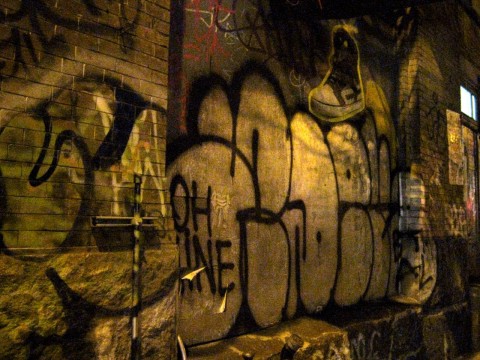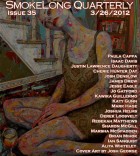On nights like this, when there was a moon, the light reflected off the roof of the warehouse and made the rest of the city look duller and unaware. The roof looked like a flat plane of some geometric wilderness. There were a few structures that housed exhaust ports or gears for the lifts.
Steele tossed the bag down. Lo and Tommy were joking and laughing. They ran around the roof and Tommy called out like he was open for a pass. You could seriously play, he said.
Your ass would fall off, Lo said and put her hair up.
Shut up, Steele said to them and unzipped the bag. He took out five cans and threw one to Lo. Spread out this time. I swear to god you two are a couple of fucking children, he said.
Tommy walked back and grabbed a can. Steele went to a corner of the roof. He shook the can back and forth. It made its click-clack click-clack click-clack. He uncapped it and started spraying. Lo found a spot and tried to think of something. Steele started spraying too. He liked to think of his troubles while he sprayed, as if it was his time to sort things out. He thought about Toby. Toby wouldn’t be out for another six months. He had served a third of his sentence already. Steele tried to convince himself that these past few months hadn’t gone by fast. Toby would write to him about his aching tooth and how no inmates trusted the dentist or even wanted to visit the infirmary for fear of catching something ghastly. Toby wrote that the days sometimes felt forever long because they were utterly the same. Steele had to remember not to write Toby back about how fast life can go sometimes, and how it seemed like they were still kids and somehow the world had overtaken them and cast them into an unswimmable ocean.
Instead he wrote about things like the job interview at a restaurant, which he didn’t get. He wrote that their mother didn’t feel good but that she was fine, and that time only moved forward and this meant it was on Toby’s side.
Lo watched Steele when he wasn’t looking. He was five years older than her and Tommy. She liked that his hands never seemed to rest. They were always in and out of his pockets, combing his hair, pulling at the skin on his face. She uncapped her can and found a spot on the edge of the far side. She took a flat piece of plastic out of her jacket pocket and started spraying, sometimes laying an edge of the plastic against the surface of the roof so to make a straight line. She was the most skilled of the three but none of them knew it.
Tommy watched Lo when she wasn’t looking. They had graduated the same year. They kissed once at a party but Lo didn’t remember and Tommy said he didn’t either. He started spraying in the middle of the roof before he had an idea. The first shape he made was a box. Then he wanted to spray the Earth inside the box but the box was too small. He looked over at Lo. She was concentrating on spraying. Some of her hair dangled in her face. The moon shone off it like a gazing ball.
Sirens called out and their pulses raced. A patrol car sped by down on the street but it kept going. A while later another car with sirens went by. The three of them thought about the city. There was a time when warehouses had their own districts, but now they were everywhere. Warehouses meant life to a city. The warehouse they were spraying had been vacant for months, like many of them here. There were apartment buildings, the last vestiges of the old system, that surrounded it. This city’s dead, Steele said as he finished. Lo and Tommy came over and gave him their cans.
We should go to Canada, Tommy said.
What’s in Canada? Lo said.
I don’t know, Tommy said. Lo looked at Steele who was looking off the roof into a window of one of the decrepit apartments across the street.
There’s a woman cutting her hair off, Steele said. They all looked.
The woman was blond. Her hair, what was left, was long. She was cutting it off slowly and unevenly. They couldn’t tell but she was crying. Steele was reminded of Toby but he didn’t know why. He was sick of everything reminding him of Toby.
What’s her deal? Tommy said.
None of your business, Tommy. You don’t have to know why every fucking thing happens, Steele said.
Let’s get down, Lo said. Steele stuffed the bag into Tommy’s stomach. They each looked a last time into the night. The air was cool and the roofs of other warehouses were in the distance. The city was dark, as if it was dead, but the glow that came from the street was enough to prove the city a fire egg being hatched by the moon. It might grow to be a real city again. Give this place twenty years, Steele said sometimes. Everyone had to live and wait. Until then all Steele could do was weather things as he could. Lo and Tommy were good at acting like they understood weathering.
When they got to the bottom they looked around and headed towards a diner. They hurried because massive clouds moved in above, but it was impossible to see if they brought a storm.



 The core workshop of SmokeLong Fitness is all in writing, so you can take part from anywhere at anytime. We are excited about creating a supportive, consistent and structured environment for flash writers to work on their craft in a community. We are thrilled and proud to say that our workshop participants have won, placed, or been listed in every major flash competition. Community works.
The core workshop of SmokeLong Fitness is all in writing, so you can take part from anywhere at anytime. We are excited about creating a supportive, consistent and structured environment for flash writers to work on their craft in a community. We are thrilled and proud to say that our workshop participants have won, placed, or been listed in every major flash competition. Community works.